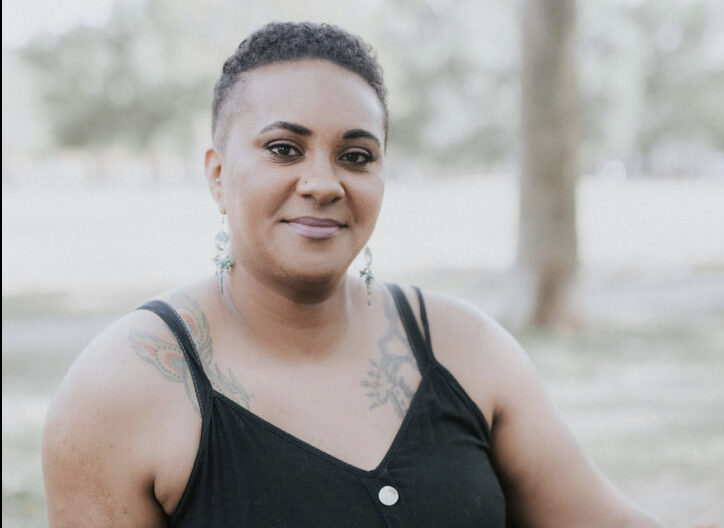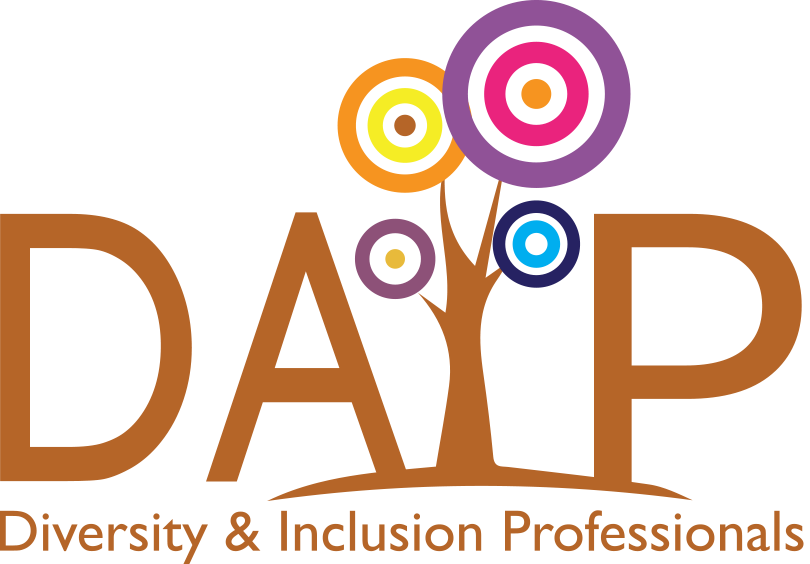
This interview is part of a series of conversations facilitated by DAIP to elevate inspiring voices that historically have been stifled. This conversation took place between Jenny Bautista-Ravreby (DAIP board of directors) and Emerald Ortiz (doula, childbirth educator, and advocate). Their conversation has been edited for length and clarity.
(Jenny Bautista-Ravreby) Emerald, I’ve had the pleasure of getting to know you both personally and professionally, and I’m excited to highlight the important work that you do! I first met you through my work managing diversity, equity, and inclusion efforts at Blue Cross Blue Shield of Rhode Island (BCBSRI), when you were enlisted to lead educational sessions focused on pregnancy and postpartum topics for our employees. When I found out that I was pregnant last year, I was fortunate to be able to hire you as a doula to support me when my daughter Talía was born. Can you share how you got into this work, and what else you do in the community outside of the ways I’ve worked with you?
(Emerald Ortiz) Years ago, a friend was pregnant and asked me to support her during her birth. It was a powerful experience, and something about it made me feel incredibly connected–to her, and to the power of birth. I completed my doula certification in 2018, but for me, the work goes much deeper than that. I’m also certified as a community health worker, and I often participate in educational panels and educate folks in small group settings.
I also spend considerable time collaborating locally with other doulas who are working towards reproductive justice and improving maternal health outcomes. I’m co-president of Doulas of Rhode Island, which is a professional organization for doulas that connects people with doulas and educates the community on what doulas do.
I am also a founding member of the Umoja Nia Collective, which is the first collective of Black-identifying doulas in the state. I’m also a current member of SISTA Fire RI’s Doulas of Color Network, which is a peer support group for BIPOC doulas in the state.
Research shows that expanding access to doula services notably improves birth outcomes and diminishes racial disparities present in health outcomes for both birthing mothers and their babies. I’m thrilled to work with other doulas of color to continue to provide customized support for expecting mothers, with a particular focus on the needs of clients of color.
(Jenny) Based on your work, you may already be aware that the theme for this year’s Black Maternal Health Week (April 11 – 17, 2023) is Our Bodies Belong to Us: Restoring Black Autonomy and Joy. What does that theme mean to you?
(Emerald) That title alone makes me smile because it’s a big part of my role and vision for this work–I educate people so they gain power and autonomy. They need to know things such as: what their rights are, what their intervention options are, what type of support they’d like, what their comfort zone is with physical touch, etc. Bodily autonomy is so important, and critical for people to feel comfortable and confident enough to advocate for their own needs. In general, it’s important to empower clients to be an active participant in birth–that’s where the autonomy and joy comes from.
(Jenny) The doula organizations you mentioned participated in the advocacy efforts for the legislation that passed in 2021 and covers the cost of doula services for many Rhode Islanders. Medicaid coverage for doula care was added to the state budget, and legislation was passed to ensure that private insurance companies were covering doula services. Can you tell me about your involvement in this advocacy work?
(Emerald) This legislation was the result of a coordinated grassroots effort on the part of the doula community. Folks from Umoja Nia and Doulas of Rhode Island were pivotal in helping craft the wording and the conditions of the bills. As a doula community, we came together and were able to advocate at the State House.
SISTA Fire was also instrumental in advocacy and community organizing throughout this process. They empowered those of us who wanted to help but didn’t know what needed to be done. They really paved the way and gave us a framework to get this across the finish line in a way that was helpful for our communities.
(Jenny) That’s incredible. This change has been so helpful for so many families, including mine! I was so grateful to be able to access doula services for my daughter’s birth.
In fact, my entire pregnancy journey last year left me feeling incredibly supported by my family and my workplace throughout the entire process, from trying to conceive, to pregnancy, to maternity leave, to postpartum. I’m sharing my experiences with the DAIP community because our community includes managers, workplace leaders, and HR professionals who need to know how they can play a role in supporting pregnant people–and specifically Black pregnant people–through this entire process.
(Emerald) Obviously in DEI work you’re mindful of cultural considerations and social determinants, things like that. Something that people might not remember to consider is that people can have vastly different past experiences with pregnancy and parenting that will impact their path and should be taken into consideration. Pregnant people may have a medical condition that complicates things, or a fertility concern, maybe they’ve previously experienced pregnancy loss. Many factors prevent people from having a straightforward pregnancy, and ensuring that there are supports within your organization to address specific needs is incredibly impactful.
Employers need to be aware that people’s individual journey or experiences may affect them and their ability to thrive and continue to do their job, and make sure you have systems and resources in place to help if needed. While benefits usually fall under HR, it is often up to DEI leads to consider equity across the organization, and to recognize and consider solutions to gaps that may impact people throughout their pregnancy journey.
(Jenny) Absolutely! Do you have any tips for folks that work in HR or other decision-making positions that are approached by employees making a request for specific support around topics related to pregnancy, childbirth, and parenting that your organization does not currently offer?
(Emerald) Here are some tactics I’ve come across through my doula experiences that decision-makers can employ at their organizations.
- Make sure you’re advocating for the things that people actually need so they’re set up for success. (For example, allowing for time off or extra support when dealing with a personal crisis like a pregnancy loss or tough postpartum period.) Pour into your people–the return on investment will be productive, happy employees.
- Be proactive, putting policies and programs in place before employee issues or needs arise. This leads to employees who feel valued and supported, which is good for everyone.
- Clearly communicate changes to benefits and resources through a variety of platforms–newsletters, email blasts, lunch-and-learns, benefits fairs. I often hear from clients that their workplace didn’t inform them that they can now access doula services as part of their benefits. Discovering this benefit earlier in your pregnancy gives you more time to find a doula that you have a good rapport with and gives your doula time to build a relationship based on trust.
- Make sure you have employee resource groups (ERGs) to create communities that can provide decision-makers with valuable feedback from employees. I often see ERGs for employees who are parents, employees who identify as LGBTQIA+, people of color, etc. These groups become a place to share knowledge, support one another, and work together to determine specific needs or gaps and then bring them to HR to consider and work together to make positive changes.
(Jenny) Exactly! ERGs can be such a great place to find like-minded folks because the power of raising a collective of voices together can really challenge stigmas and perspectives.
When I first met you, Emerald, BCBSRI invited you to host a Coffee Chat for Pregnant and Infant Loss Awareness Month. The program was a suggestion to me by one of the ERGs who requested a platform to learn about pregnancy and infant loss and build a community. We got positive feedback that the program allowed folks to talk about a difficult topic in a constructive way. It was a great example of how you can build a sense of community and belonging in the workplace.
I’d like to dive a little deeper into your recommendations. Many times, middle managers are the ones directly impacting. What can HR do to empower, support, and educate managers who are regularly engaging with the employees who need support? For example, how can they help when employees transition back to work after a maternity leave?
(Emerald) It starts with being mindful of what people are going to need. Managers are the daily direct touchpoints for their direct reports, so they should regularly get refreshers so they know what benefits are available and how employees can access them. HR should provide appropriate training and support for managers so they’re able to determine the right questions to ask to lead to the appropriate referrals. I do this as well with my clients who need referrals–whether it’s a lactation specialist, food insecurity support, mental health professional, etc.
If you’re intentional and systematic in setting your employees up for success, you’re much less likely to waste time and resources being reactive when things go wrong. At the end of the day, the business is going to regret it if employees are missing work to deal with things like medical and mental health concerns because they fell through the gaps and didn’t have support.
(Jenny) Yes, so managers don’t necessarily need all the answers, but they have to make space to ask the right questions so they can direct folks to the appropriate support.
I also want to get your perspective on the importance of not just workplace support for pregnant employees, but also for spouses and partners of people who give birth. What helped me the most postpartum was that my husband had three months of paternity leave. How can we encourage and normalize partners having adequate leave benefits?
(Emerald) Access to paternity leave is important, as well as knowledge of how TDI and TCI works. There are typically gaps in knowledge of the resources even available to expecting parents. Since every family’s needs are different, there may not be a clear-cut answer, but employees shouldn’t be left to figure things out entirely on their own. Both HR leads and team managers should be equipped to help direct employees identify the best resources for their specific situation. And hopefully paternity leave will be the norm soon.
(Jenny) To wrap up this conversation, I’d love to hear about any moments that have really stood out to you as validation of the importance of this work?
(Emerald) Through a monthly miscarriage support group that I host, I met a woman who had experienced a loss. When she eventually ended up getting pregnant again, I was able to support her as her doula, and it was very emotional for both of us. It felt very full circle.
And my experience with you was very rewarding, Jenny! I met you when I gave a talk at your workplace, and then I had the honor of supporting you through your pregnancy, labor, and delivery. You were amazing–I got to witness your immediate transformation to mom. You were confident, you did things on your own terms, you knew what you wanted to do, and you stayed strong as you worked towards your goals. That’s what I wish for all my clients! That’s why I do this work.
(Jenny) Emerald, I appreciate what you’ve brought to my personal pregnancy and motherhood journey, and I’m so glad to share your knowledge with the DAIP community. Thank you so much for sharing your perspectives with us!
Resources referenced in this conversation:
- Sacred Wombanhood Birth Support Services (founded and owned by Emerald)
- Doulas of Rhode Island
- SISTA Fire

